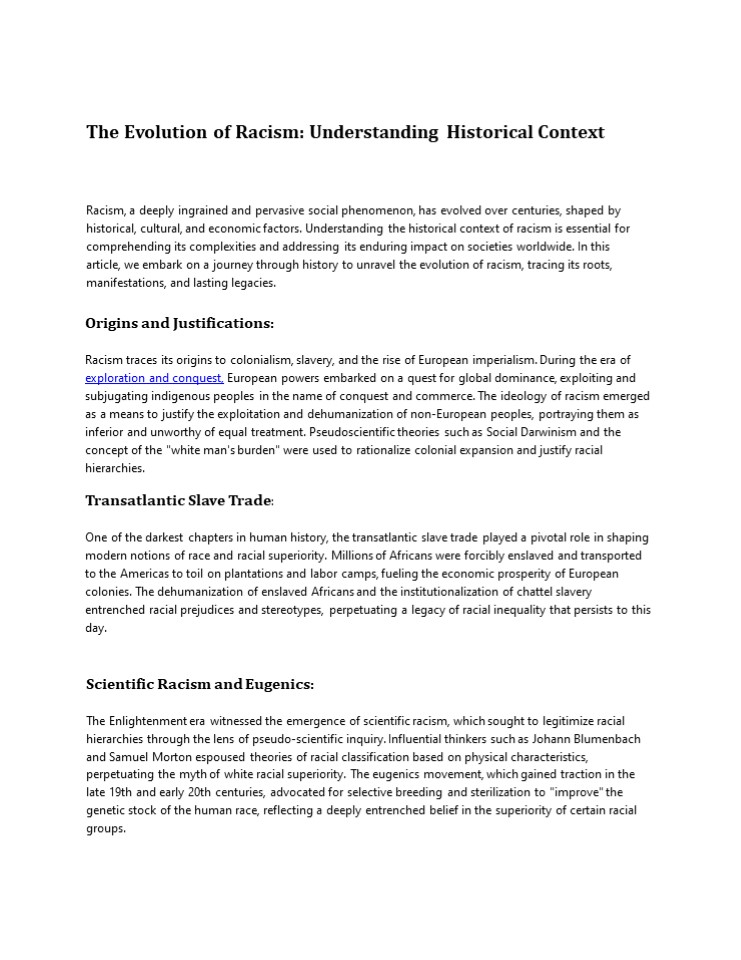The Evolution of Racism: Understanding Historical Context - PowerPoint PPT Presentation
Title:
The Evolution of Racism: Understanding Historical Context
Description:
Understanding Historical Context" offers a concise exploration of the origins, manifestations, and enduring impact of racism throughout history. From its roots in colonialism and slavery to its contemporary forms of institutionalized discrimination, the article delves into the complex interplay of historical, cultural, and economic factors that have shaped the evolution of racism. By tracing the trajectory of racism from its origins to present-day challenges, the article provides insight into the enduring legacy of racial injustice and the ongoing struggle for equality and social justice. – PowerPoint PPT presentation
Number of Views:0
Title: The Evolution of Racism: Understanding Historical Context
1
The Evolution of Racism Understanding Historical
Context
Racism, a deeply ingrained and pervasive social
phenomenon, has evolved over centuries, shaped by
historical, cultural, and economic factors.
Understanding the historical context of racism is
essential for comprehending its complexities and
addressing its enduring impact on societies
worldwide. In this article, we embark on a
journey through history to unravel the evolution
of racism, tracing its roots, manifestations, and
lasting legacies.
Origins and Justifications Racism traces its
origins to colonialism, slavery, and the rise of
European imperialism. During the era of
exploration and conquest, European powers
embarked on a quest for global dominance,
exploiting and subjugating indigenous peoples in
the name of conquest and commerce. The ideology
of racism emerged as a means to justify the
exploitation and dehumanization of non-European
peoples, portraying them as inferior and unworthy
of equal treatment. Pseudoscientific theories
such as Social Darwinism and the concept of the
"white man's burden" were used to rationalize
colonial expansion and justify racial
hierarchies. Transatlantic Slave Trade One of
the darkest chapters in human history, the
transatlantic slave trade played a pivotal role
in shaping modern notions of race and racial
superiority. Millions of Africans were forcibly
enslaved and transported to the Americas to toil
on plantations and labor camps, fueling the
economic prosperity of European colonies. The
dehumanization of enslaved Africans and the
institutionalization of chattel slavery
entrenched racial prejudices and stereotypes,
perpetuating a legacy of racial inequality that
persists to this day.
Scientific Racism and Eugenics The Enlightenment
era witnessed the emergence of scientific racism,
which sought to legitimize racial hierarchies
through the lens of pseudo-scientific inquiry.
Influential thinkers such as Johann Blumenbach
and Samuel Morton espoused theories of racial
classification based on physical characteristics,
perpetuating the myth of white racial
superiority. The eugenics movement, which gained
traction in the late 19th and early 20th
centuries, advocated for selective breeding and
sterilization to "improve" the genetic stock of
the human race, reflecting a deeply entrenched
belief in the superiority of certain racial
groups.
2
Jim Crow Segregation
In the aftermath of the Civil War and the
abolition of slavery, the United States grappled
with the legacy of racial oppression and
inequality. The implementation of Jim Crow laws
in the Southern states institutionalized racial
segregation and discrimination, relegating
African Americans to second-class citizenship and
denying them basic rights and liberties. The
legacy of Jim Crow continues to shape patterns of
racial segregation and inequality in the United
States, underscoring the enduring impact of
historical injustices on contemporary society.
Decolonization and Anti-Colonial Struggles The
mid-20th century witnessed a wave of
decolonization and anti-colonial struggles across
Africa, Asia, and the Middle East, as colonized
peoples rose up against imperial rule and
asserted their right to selfdetermination. These
movements challenged the entrenched structures of
racism and colonial domination, inspiring a
renewed commitment to racial equality and social
justice. Leaders such as Mahatma Gandhi, Nelson
Mandela, and Frantz Fanon became symbols of
resistance and liberation, advocating for the
dismantling of racial hierarchies and the
establishment of inclusive, egalitarian societies.
Contemporary Challenges
Despite significant progress in the fight against
racism, the struggle for racial equality remains
far from over. In the 21st century, racism
continues to manifest in various forms, from
overt acts of discrimination and violence to more
subtle forms of institutionalized racism and
systemic inequality. Issues such as police
brutality, mass incarceration, and xenophobia
highlight the enduring impact of historical
injustices and the urgent need for comprehensive
and sustained efforts to combat racism in all its
forms. Understanding Historical Context" offers a
concise exploration of the origins,
manifestations, and enduring impact of racism
throughout history. From its roots in colonialism
and slavery to its contemporary forms of
institutionalized discrimination, the article
delves into the complex interplay of historical,
cultural, and economic factors that have shaped
the evolution of racism. By tracing the
trajectory of racism from its origins to
present-day challenges, the article provides
insight into the enduring legacy of racial
injustice and the ongoing struggle for equality
and social justice.































